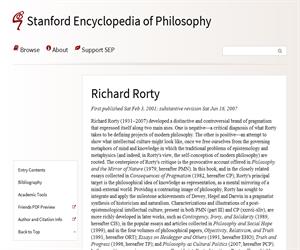
Cargando...
Zer egin dezaket?
226322 materialEducativo
textoFiltroFichaBaliabide honi buruz...

Richard Rorty (1931–2007) developed a distinctive and controversial brand of pragmatism that expressed itself along two main axes. One is negative—a critical diagnosis of what Rorty takes to be defining projects of modern philosophy. The other is positive—an attempt to show what intellectual culture might look like, once we free ourselves from the governing metaphors of mind and knowledge in which the traditional problems of epistemology and metaphysics (and indeed, in Rorty's view, the self-conception of modern philosophy) are rooted. The centerpiece of Rorty's critique is the provocative account offered in Philosophy and the Mirror of Nature (1979, hereafter PMN). In this book, and in the closely related essays collected in Consequences of Pragmatism (1982, hereafter CP), Rorty's principal target is the philosophical idea of knowledge as representation, as a mental mirroring of a mind-external world. Providing a contrasting image of philosophy, Rorty has sought to integrate and apply the milestone achievements of Dewey, Hegel and Darwin in a pragmatist synthesis of historicism and naturalism.
Kide hauentzat bakarrik:

Mira un ejemplo de lo que te pierdes
Kategoriak:
Etiketak:
Fecha publicación: 2.2.2015
Baliabidearen jatorrizko lizentzia errespetatzen da.
Aipatu nahi al duzu? Erregistratu o Hasi saioa
Didactalia-ri Gehitzea Arrastra el botón a la barra de marcadores del navegador y comparte tus contenidos preferidos. Más info...
Aipatu
0